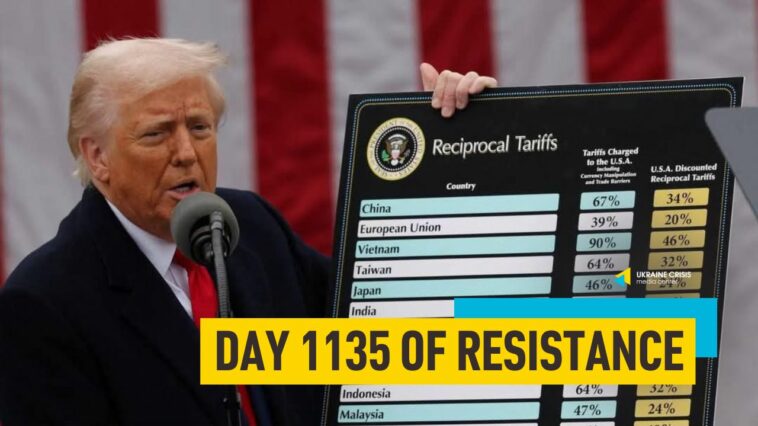Trump imposes sweeping tariffs on foreign countries but Russia. Rubio reassures allies of U.S. commitment to NATO. Denmark announces a new aid package of almost USD one billion for Ukraine.
Trump imposes sweeping tariffs on foreign countries but Russia
President Trump on Wednesday announced the U.S. will impose a minimum baseline of 10 per cent tariffs on goods imported from all foreign countries, as well as higher, “reciprocal” tariffs on nations that have their own tariffs placed on the U.S.
“It’s our declaration of economic independence,” Trump said in the White House Rose Garden. He dubbed the move “Liberation Day”.
“For decades, our country has been looted, pillaged, raped and plundered by nations near and far, both friend and foe alike,” Trump said in a speech announcing the tariffs. “American steelworkers, autoworkers, farmers and skilled craftsmen, we have a lot of them here with us today, they really suffered gravely. They watched in anguish as foreign leaders have stolen our jobs. Foreign cheaters have ransacked our factories, and foreign scavengers have torn apart our once beautiful American dream.”
He said the U.S. trade deficit soared to a record USD 1.2 trillion in 2024 and blamed the Biden administration for it.
The reciprocal tariffs, Trump said, will amount to roughly half the tariff rate those countries impose on U.S. exports, or less. Countries that will see “discounted reciprocal rates” include China at a rate of 34 per cent, on top of the tariffs the U.S. already imposes on China; 20 per cent on goods from the European Union; 24 per cent on Japan; 27 per cent on India (according to a White House executive order cited by the media); 25 per cent on South Korea (as displayed on a chart); 30 per cent on South Africa; 17 per cent on Israel and 31 per cent on Moldova.
Ukraine is going to have a 10 per cent baseline tariff.
The latest round of tariffs does not include Russia.
Canada and Mexico are not subject to these tariffs for now, senior administration officials said, but tariffs Trump has already imposed persist.
“But now it’s our turn to prosper and in so doing, use trillions and trillions of dollars to reduce our taxes and pay down our national debt,” Trump said.
He also said the move will make America wealthy again: “We truly can be very wealthy. We can be so much wealthier than any country, it’s not even believable, but we’re getting smart.”
The 10 per cent baseline tariff goes into effect on April 5 while the “reciprocal tariffs” on specific countries will begin on April 9.
Trump’s administration on Wednesday confirmed that his 25 per cent global car and truck tariffs will take effect as scheduled on Thursday and that duties on automotive parts imports will be launched on May 3.
Rubio reassures allies of U.S. commitment to NATO
U.S. Secretary of State Marco Rubio told NATO allies on Thursday that Washington remained committed to the alliance.
“President Trump has made clear he supports NATO,” Rubio said. “We’re going to remain in NATO,” he told reporters as he greeted NATO Secretary-General Mark Rutte before the foreign ministers meeting in Brussels.
Mentioning the four U.S. soldiers who died during a training exercise in Lithuania, he said: “We honor them. And it also reminds us that the United States is in NATO.”
Rubio said the U.S. expected NATO allies to spend more on defense and would give them some time to do so: “We do want to leave here with an understanding that we are on a pathway, a realistic pathway, to every single one of the members committing and fulfilling a promise to reach up to 5 per cent in spending.”
“We want NATO to be more viable. And the only way NATO can get stronger and more viable is if our partners, the nation-states that comprise this important Alliance, have more capability. (…) But we’ve prioritized defense because of the role we’ve played in the world, and we want our partners to do the same,” he said.
Denmark announces new aid package of almost USD one billion for Ukraine
The Danish defense ministry said on Thursday that the country’s government held consultations with lawmakers from the foreign policy committee on a new aid package for Ukraine worth 6.7 million Danish kroner, an equivalent of USD 970 million.
The 25th package aims to support Ukraine during 2025-2027 by drawing on Denmark’s Ukraine fund, the ministry said as cited by Ukrainian news site “European Pravda”.
Key elements of the package include air defense capabilities, artillery and financial support to Ukraine’s Air Force.
“The security situation is changing rapidly. Therefore, it is crucial that Denmark continues its large-scale support for Ukraine (…) With the 25th aid package, we reaffirm our commitment to Ukraine both in the short and long term,” Danish Defense Minister Troels Lund Poulsen said, according to a translation provided by “European Pravda”.
Denmark’s Foreign Minister Lars Løkke Rasmussen said the new package would “enhance Ukraine’s combat capability”.
“Ukraine’s security is crucial for the future of all of Europe. I hope our support will inspire other allies to provide even greater assistance,” he emphasized.
Denmark has committed 1.4 billion of Danish kroner to send artillery systems and munitions to Ukraine in 2025-2027. More funds will be allocated to support the country’s air defenses, the drone coalition and IT coalition, the Defense Ministry said in a statement.
The country said it plans to continue investing in Ukraine’s defense industries under the “Danish model” that enables military spending on locally produced weapons. The example is set to encourage other allies to finance Ukrainian defense production.
“The Danish model has demonstrated that Ukraine has the potential to produce and supply equipment for its fight for freedom. Denmark must continue investing in this, and I hope other countries will follow our example even more,” Poulsen said.




